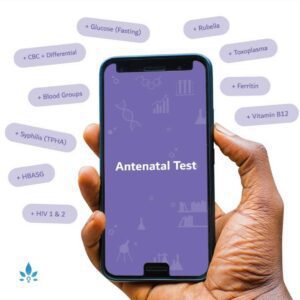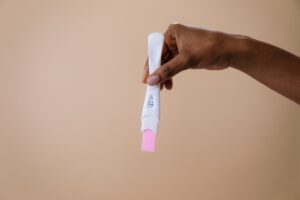Accuracy of Home Pregnancy Tests


Taking an at home pregnancy test is often the first thing a female will do if she suspects that she is pregnant. With modern kits claiming reliable results from as early as four days before menstruation (menses) is due to start, they are considered a quick, affordable, risk-free and non-invasive tool, that can be used from the comfort of your own home. It is no wonder their use is so widespread, but are they reliable; will they produce an accurate result and, if positive, how confident can you be that you really are pregnant?
How at home pregnancy tests work
Many women will be familiar with how a pregnancy test works, even without personal experience; they are a commonly utilised prop in TV dramas and, with multiple brands and variants available, they are easily recognisable on the shelves of any pharmacy and most supermarkets.
The premise is simple; hold the stick in your urine stream, wait a few minutes for the test to work and then a small screen will reveal yes or no, + or -, pregnant or not pregnant. Some will also guesstimate exactly how many weeks along you are.
The tests work by detecting the levels of human chorionic gonadotrophin (HCG) in the urine. HCG is known as the ‘pregnancy hormone’, it is produced once the fertilized egg is implanted in the wall of the uterus and levels will double every two to three days, until it reaches peak levels at about 10 weeks gestation.
Can Accuracy of Home Pregnancy Tests Be Trusted?
Most home pregnancy tests are reasonably accurate, provided the instructions are followed carefully. A positive result will almost always be accurate, but a negative result may be more questionable. If you suspect you are pregnant and have missed a period, but your result was negative, it may be worth repeating the test in a couple of days.
A false negative result might occur if the test is taken too early. There is an 8-10 day window between conception and implantation when HCG will not be produced. If taken in this time, a test will always give a negative result. Not all women will necessarily know exactly when they conceived and, even if they do, cycle fluctuations might mean that determining the point of implantation is difficult. Women who experience irregular cycles are particularly susceptible to false negative results as they may misjudge precisely when their period is due.
Some medications can affect the results of a pregnancy test. Certain drugs used to treat allergies, as well as anti-anxiety medications, antipsychotics, anticonvulsants and fertility drugs can all lead to a false result. Antibiotics and the oral contraceptive pill will not affect the accuracy of the test. If you are taking any medications and suspect you might be pregnant, you should make an appointment with your doctor, firstly to confirm whether you actually are, but also to discuss the safety implications of remaining on your medication for the duration of your pregnancy.
Whilst false positive results are rare, they can happen, usually as a result of a very early pregnancy loss. 15-20% of conceptions result in a spontaneous miscarriage, often before a female is even aware that she has conceived. The advent of pregnancy tests that can be used prior to a missed period, has raised the likelihood of such an event occurring and is perhaps one reason to wait for the suspected day of menses before testing.
How to maximize the effectiveness of an at home pregnancy test
As mentioned earlier, waiting until at least the day that your period is due, will give a more accurate result. Studies have questioned the validity of claims made by some manufacturers that their tests can accurately detect pregnancy up to four days before a period is due. These same studies do agree that tests used on the day of suspected menses will usually give an accurate result. Most at home tests can detect more than 50% of pregnancies by the expected day of menses.
In practical terms, you can also improve the effectiveness of a pregnancy test by taking certain steps. Try performing the test first thing in the morning, when HCG levels are at their highest. Avoid diluting your urine by minimizing the amount of fluids you consume immediately before taking the test. Make sure that the stick has sufficient exposure to urine (if in doubt, collect in a sample pot and measure from there) and that you wait long enough before checking the results. Also, check that the control panel has given the correct result, as this will indicate whether the test is working.
In conclusion, these tests serve as valuable methods to clinically validate pregnancy. Personally, both of my pregnancies were first detected using a shop-bought pregnancy test. In both instances I waited until well past the day that my period was due, and, in fact, once a positive result was obtained, I underwent no further medical testing/confirmation until I had my 12 week ultrasound scan.
Nabta is reshaping women’s healthcare. We support women with their personal health journeys, from everyday wellbeing to the uniquely female experiences of fertility, pregnancy, and menopause.
Try Birth preferences session and learn more in case you are pregnant.
Get in touch if you have any questions about this article or any aspect of women’s health. We’re here for you.
Sources:
- Cole, Laurence A. “The Utility of Six over-the-Counter (Home) Pregnancy Tests.” Clinical Chemistry and Laboratory Medicine, vol. 49, no. 8, Aug. 2011, pp. 1317–1322., doi:10.1515/cclm.2011.211.
- “Home Pregnancy Tests: Can You Trust the Results?” Mayo Clinic, Mayo Foundation for Medical Education and Research, 12 Jan. 2019, https://www.mayoclinic.org/healthy-lifestyle/getting-pregnant/in-depth/home-pregnancy-tests/art-20047940.
- “How Accurate Are Home Pregnancy Tests?” NHS Choices, NHS, https://www.nhs.uk/common-health-questions/pregnancy/how-accurate-are-home-pregnancy-tests/.
- Morse, Jessica E., et al. “Evidence-Based Pregnancy Testing in Clinical Trials: Recommendations from a Multi-Stakeholder Development Process.” Plos One, vol. 13, no. 9, 12 Sept. 2018, doi:10.1371/journal.pone.0202474.













































